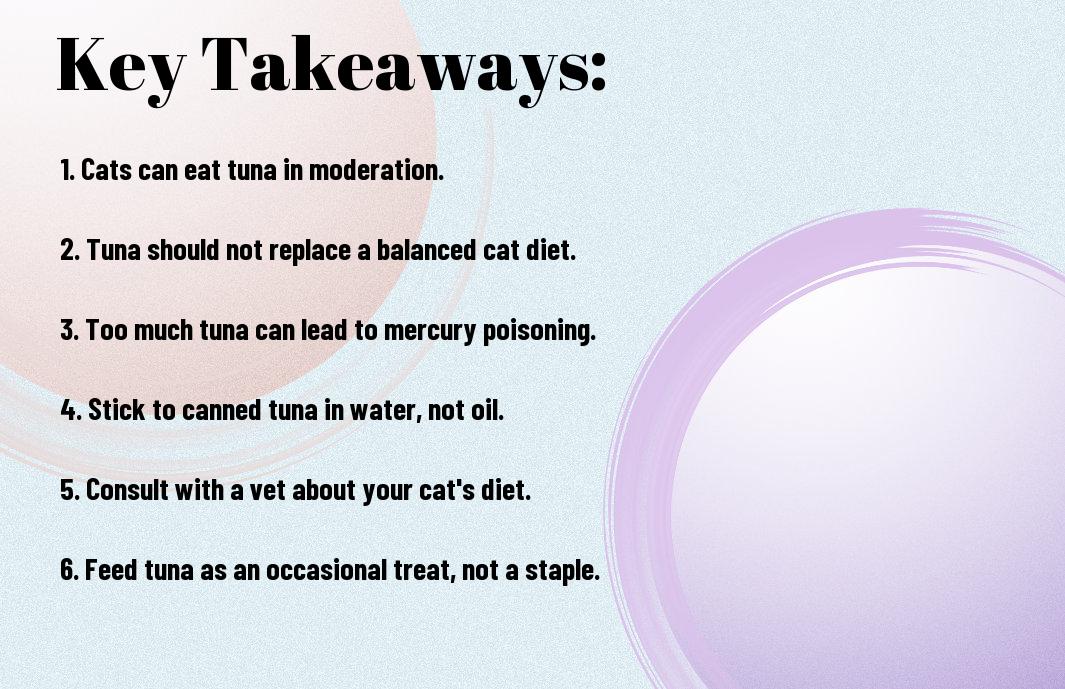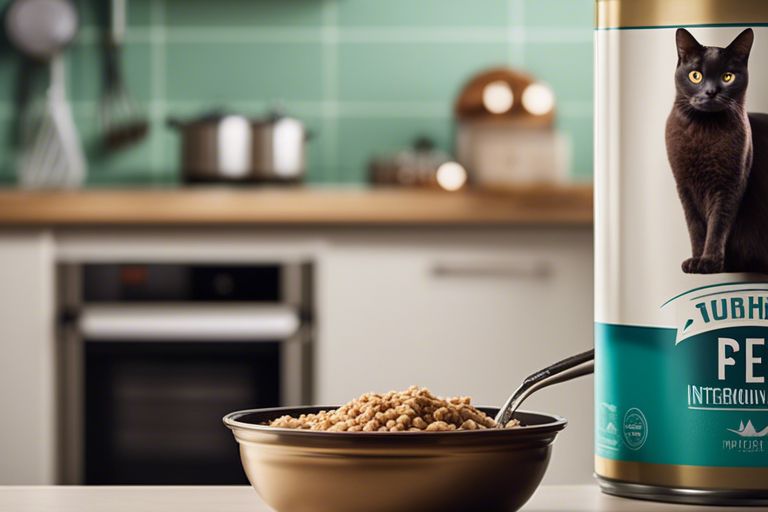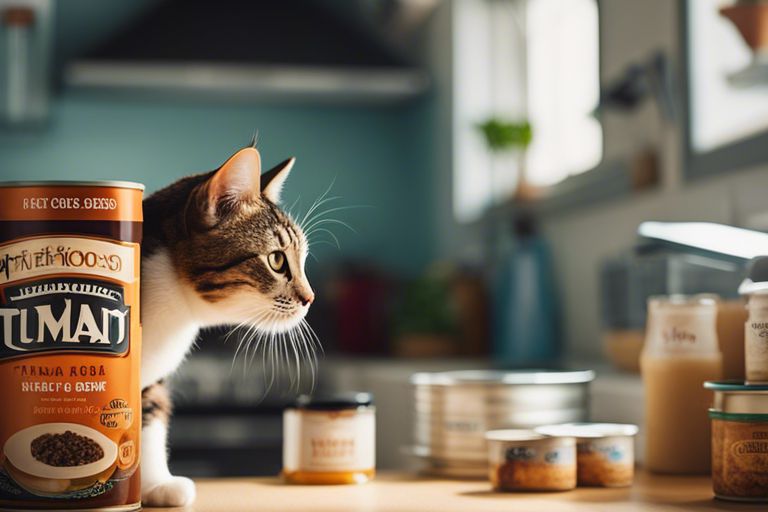Do you ever wonder about the safety of feeding tuna to your feline friend? While many cats enjoy the taste of tuna, it’s important to understand the potential hazards associated with this popular seafood. Tuna can be a dangerous choice for cats if not given in moderation and prepared properly. High levels of mercury, lack of essential nutrients, and possible contamination all pose potential risks to your cat’s health when consuming tuna. However, when fed in controlled amounts, tuna can be a safe treat for your cat and provide them with essential omega-3 fatty acids. In this blog post, we will delve into the question of whether cats can eat tuna and provide you with the necessary information to make an informed decision for your feline companion.

Nutritional Value of Tuna for Cats
Some cat owners may wonder about the nutritional value of tuna for their feline companions. Tuna is a good source of protein, and also provides essential nutrients such as omega-3 fatty acids, selenium, and vitamin D. These nutrients play a crucial role in maintaining a cat’s overall health and well-being.
Benefits of Tuna in a Cat’s Diet
One of the main benefits of including tuna in a cat’s diet is the high protein content. Protein is essential for muscle growth, repair, and overall body function in cats. Additionally, the omega-3 fatty acids found in tuna can contribute to a healthy skin and coat, as well as supporting cognitive function and reducing inflammation.
Moreover, tuna is a good source of vitamin D, which is important for calcium absorption and bone health in cats. However, it is important to note that tuna should not be the sole source of nutrition for cats, as they require a balanced diet that includes other nutrients not found in tuna.
Risks Associated with Tuna Consumption
Benefits associated with tuna consumption, there are also potential risks that cat owners should be aware of. One of the primary concerns is the high mercury content in some types of tuna. Mercury can be toxic to cats if consumed in large amounts, leading to neurological issues and potential organ damage. Additionally, certain types of canned tuna may contain additives such as salt or seasonings, which can be harmful to cats if consumed in excess.
Consumption of large amounts of tuna can also lead to a condition called steatitis, or yellow fat disease, in cats. This is caused by an imbalance of nutrients, particularly an excess of unsaturated fatty acids, and can lead to a variety of health issues including painful inflammation of the fat tissue.

Tuna Forms and Feline Health
Any cat owner knows that cats can be quite finicky when it comes to their food. One question that often arises is whether cats can eat tuna and if it is safe for them. Tuna is a popular fish, and it is often included in many commercial cat food formulations. However, it is essential to understand the different forms of tuna and how they can affect feline health.
Canned Tuna vs Fresh Tuna
Tuna is available in both canned and fresh forms, and both can be included in a cat’s diet. Canned tuna is convenient and readily available, but it often contains high levels of sodium and may be packed in oil, which can be harmful to a cat’s digestive system. On the other hand, fresh tuna provides high-quality protein and essential nutrients, but it should be thoroughly cooked to eliminate the risk of parasites.
Frequency and Portion Control
Forms of tuna can be included in a cat’s diet as an occasional treat, but it should not be a staple food. While tuna is rich in protein, cats require a balanced diet that includes a variety of nutrients to support their overall health. Limiting the frequency of tuna consumption and controlling the portion size is crucial to prevent nutritional imbalances and potential health issues.
Health is a critical consideration when it comes to incorporating tuna into a cat’s diet. Regular consumption of tuna can lead to mercury poisoning, which can have detrimental effects on a cat’s health. It is vital for cat owners to be mindful of the potential risks and to consult with a veterinarian to ensure a balanced and safe diet for their feline companions.

Alternatives to Tuna
After reading about the potential risks of feeding your cat too much tuna, you may be wondering what other options are available. It is important to note that while tuna can be fed to cats in moderation, it should not be a staple in their diet. For more information about the risks and benefits of feeding tuna to your cat, you can check out Can cats eat tinned tuna?
Other Safe Fish Options for Cats
Safe fish options for cats include salmon, trout, and sardines. These fish are rich in omega-3 fatty acids, which can contribute to your cat’s overall health. However, it is important to note that these fish should also be fed in moderation, as too much of any one fish can lead to an imbalance of nutrients in your cat’s diet.
Additionally, it is important to ensure that any fish fed to your cat is cooked thoroughly and does not contain any bones, as these can pose a choking hazard or cause internal injuries.
Non-Fish Alternatives
Alternatives to fish for your cat’s diet include poultry, such as chicken or turkey, and lean cuts of beef. These protein sources can provide your cat with essential nutrients while reducing their exposure to potential toxins found in certain types of fish.
It is important to consult with your veterinarian before making any major changes to your cat’s diet. It is also essential to ensure that any protein sources you provide for your cat are cooked thoroughly and free from any seasonings or additives that could be harmful to their health.
Is It Safe for Cats to Eat Different Types of Meat?
Many cat owners wonder about cats eating chicken safety. While chicken is a popular choice, other meats like beef, turkey, and fish can also be safe for cats in moderation. However, it is important to ensure the meat is thoroughly cooked and free from seasoning or additives that could be harmful to cats.
Can Cats Eat Tuna? Is It Safe For My Cats?
Conclusively, while tuna may be a popular treat for cats, it should be fed to them in moderation due to the potential risks associated with mercury poisoning and nutritional imbalances. It’s important to ensure that the tuna is properly prepared, devoid of any additional seasonings or additives that could be harmful to your feline companion. Additionally, it’s recommended to consult with a veterinarian before introducing tuna into your cat’s diet, especially if they have any existing health conditions. As a responsible pet owner, it’s crucial to prioritize the overall well-being and health of your cat, and providing a balanced diet that meets their nutritional needs is essential for their long-term health and happiness.
FAQ
Can cats eat tuna?
Yes, cats can eat tuna. Tuna can be a tasty treat for cats and is often found in commercial cat foods.
Is tuna safe for cats to eat?
While tuna is generally safe for cats to eat, it should be given in moderation. Tuna contains high levels of mercury which can be harmful to cats if consumed in large amounts over time. Additionally, tuna should not be the sole source of nutrition for cats as it lacks essential nutrients that cats need in their diet.
What type of tuna is safe for cats to eat?
When feeding tuna to your cat, it is best to choose canned tuna in water, rather than in oil or with added spices. It is important to ensure the tuna is plain and not seasoned with any ingredients that may be harmful to cats. Additionally, feeding your cat fresh, cooked tuna is a safer option than feeding them raw tuna, as raw fish can contain bacteria and parasites that may be harmful to cats.

Hello there, I am Iftekhar Ahmed. I am the owner of Mishka & The Cat Corners. I love to explore and write on various topics about cats

